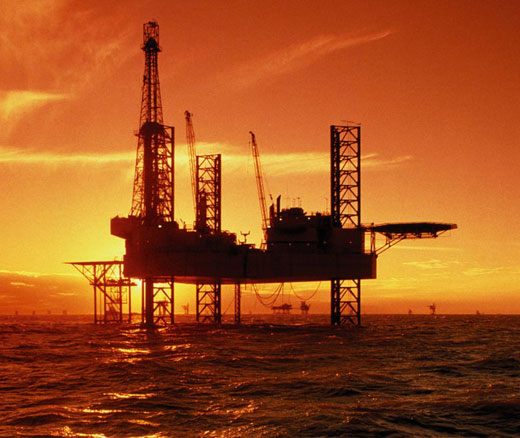Podcast: Play in new window | Download
Subscribe: RSS

A Russian oil rig in the North Sea. New oil wells are deeper, more expensive, more complicated — and play out faster — than ever.
A teleconference of world energy, financial, political and military officials organized out of Washington and London last month agreed that a full-blown global energy crisis could erupt as early as 2016. The conference was convened by Daniel Davis, a whistleblower colonel in the United States Army “acting in a private capacity,” and Jeremy Leggett, a contrarian British oil geologist. The conference took place in December, and was brought to light by Britain’s Guardian newspaper last week.
One of the speakers, Mark Lewis, former chief energy researcher at Deutsche Bank, identified three problems that are poised to bring the global system down:
-
High decline rates. It is becoming better known that hydraulic-fracturing oil and gas wells, on which ride the hopes of the United States energy industry, have extremely high decline rates and useful lives of only about five years. Even less well known is that, according to International Energy Agency numbers, the world’s leading conventional oil fields are declining at over six per cent a year. This decline rate makes it very difficult to maintain, let alone increase, world production to meet rising demand.
-
Rising investment costs. Whether in fracking or in conventional fields, wells are far more expensive than they used to be, because they are in deeper water, more remote areas or require more complicated technology. IEA numbers show that since 2000, the global oil industry has increased its investment in production by 200-300 per cent, but has managed to increase production only by 12 per cent — in 14 years! The trend, said Lewis, is clear; ever more money chasing less and less oil.
-
Decreasing exports. Exports are falling faster than production, for the simple reason that the population of most oil-rich countries is increasing (in OPEC countries, at double the global average rate) and consuming the oil at home. The trend is amplified by the fact that countries from Egypt to Saudi Arabia to Iran subsidize oil consumption by their people with the income from oil exports, which are being substantially reduced by the consumption. Vicious circle.
Presenter David Hughes, formerly of the Geological Survey of Canada, cited official statistics to show that the fracking boom in the United States, touted as a petroleum renaissance and a road to energy independence, will play out in another two years, returning the US and the world to the inevitability of rising prices, declining supplies and an eventual crash.
Colonel Davis’s role in this conference is intriguing. He is on active duty, and told the participants that “A lot of high-ranking officials are starting to ask exactly these hard questions about the sustainability of the current energy system.” But he stipulated that when he organized the conference he was, as the Guardian phrased it, “operating in his private capacity.”
In 2012, on returning from a second deployment to Afghanistan., Colonel Davis went public — and went to Congress — with his belief that the war there was a disaster and that top US commanders, including General David Petraeus, were lying when they reported that all was well. Colonel Davis told a reporter he expected to get “nuked” for taking on the brass. Yet here he is, still in uniform, still on duty (albeit still a light colonel), once again taking a public position that cannot be pleasing to his commanders.
Or can it? Here’s what he told the recent conference about that:
“You’ve got to remember that for the military, it doesn’t matter what you want to do. What matters is what you can do, and it’s our top priority to make sure we understand potential limits to our operational capability.”
Is it possible the military understands what the politicians deny and the media ignore?
Energy flow is a major factor in the operation of the technological systems of civilization. So it is not surprising that there is so much concern amongst the powerful about the ongoing supply of concentrated energy. But that is only one materialistic issue that needs to be addressed. Materialistic transformation to waste is associated with the energy flow and climate change is one consequence.The technological systems have limited lives and many will be irreplaceable as the natural resources they use become scarce. Industry focuses on energy supply as this is where they make their money but governments should address the holistic problems.